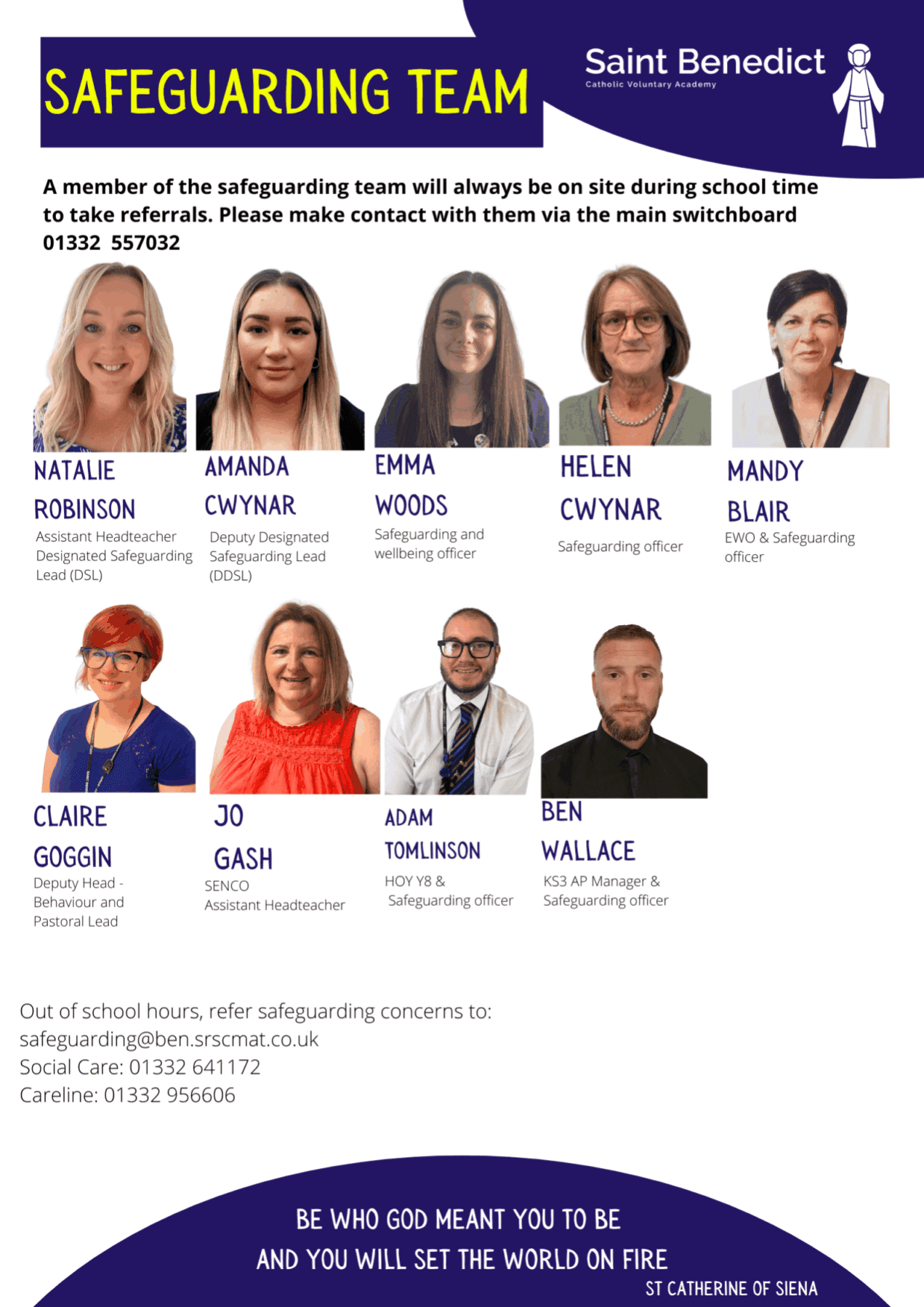Everyone working in, or for Saint Benedict Catholic Voluntary Academy, shares an objective to help keep children and young people safe by contributing to:
- Providing a safe environment for children and young people to learn in education settings.
- Identifying children and young people who are suffering or likely to suffer significant harm and taking the appropriate action with the aim of making sure they are kept safe both at home and in the Academy setting.
All staff undergo regular training to ensure they are aware of the most up to date practice in Keeping Children Safe in Education.
Students receive regular inputs and information sessions which enable them to be aware of keeping themselves safe, in school, out of school and online.
The Designated Safeguarding Lead is Mrs Natalie Robinson.
The Deputy Designated Safeguarding Lead is Miss Amanda Cwynar.
They are assisted by the wider Safeguarding Team : Miss Emma Woods, Mrs Helen Cwynar, Mrs Amanda Blair, Mr Adam Tomlinson, Mrs Claire Goggin, Mrs Johanna Gash.
The governor with responsibility for overseeing the work of the Safeguarding team is Mr Joe Connolly.
If you do have any worries or concerns regarding the welfare of a pupil, please do contact us.
A member of the Safeguarding Team is always available, and you can contact us or make an appointment with us by calling us on 01332 557032.
If you are wishing to report a concern to our designated safeguarding lead at any point including, out of hours e.g. weekends, evenings, school holidays, please do so via Safeguarding@ben.srscmat.co.uk
Out of hours
If you have immediate safeguarding concern about a child, you can refer to social care on 01332 641172 or call Derbyshire Police on 101
Saint Benedict’s Early Help Offer
From time to time, we all go through situations which are difficult to cope with. We often hear about families who are struggling and are in need of support. This is where our pastoral team and safeguarding team are standing by to support our families.
At these times, we need help and advice but finding the right department or agency can be a minefield. The Early Help Offer gives parents a framework for asking for support. Our pastoral team and safeguarding team are able to support families by completing an Early Help Assessment to support you in finding the right support. This may be behaviour support, parenting advice, bereavement counselling, health advice or financial support. (The list is not finite.)
At Saint Benedict, we regularly link up families with such services in order to best support our pupils and their families. If in any doubt, please come and talk to us. We are here for you.
What is Early Help?
Our primary aim is to identify needs early and to make sure that appropriate support is put into place. ALL staff recognise their role in ensuring safeguarding practices for all children at all times. We believe that information sharing, and timely effective support can ensure that all children and families are supported whatever the circumstance. Families may need support from a wide range of agencies and the Early help assessments brings those agencies together for you.
We recognise that other agencies will be able to support families based on their specialised work. Therefore, our role is often to signpost families to the resources that will best support their needs. Saint Benedict’s school understands their responsibilities and as a school we will carry out our duties in ensuring the effectiveness of Early Help Services for pupils in accordance with the requirements of the Children Act 2004 and within the statutory guidance “Working Together 2018”.
In summary, these are to:
-
Identify children and their families who would benefit from Early Help
- Ensure signposting of targeted Early Help services to address the assessed needs of a child and family which focuses on activity to significantly improve the outcomes for the child. This involves the use of evidence based interventions as set out by the Early Intervention Foundation (www.eif.org.uk/how-do-we-know-early-intervention-works/(opens in new tab))
- Share information on that provision which is consistent with the child’s welfare and with due regard to confidentiality.
Our Early Help Approach
- Hearing what children have to say and using the voice of the child. We treat what the children share with us seriously, and value what they say.
- Hearing what parents/carers have to say and signposting support agencies.
-
Using the Early Help Assessment: This starts with an Early Help conversation (TAF – Team around the family) . As a parent or carer, you will chat with a member of the safeguarding team about your family’s situation, and they will let you know what sort of help is available. This conversation might lead to an Early Help Assessment (EHA). This is how we get a full picture about the whole family.
It‘s your choice to take part in the assessment and you can choose who else should be involved. Every person and family is different, but an Early Help Assessment (EHA) will:
- Help you see what’s going well and not so well for your family
- Help you and others to see what support you might need
- Create a picture of your family’s circumstances, which can be shared with your permission so you don’t have to repeat yourself to different workers
- Help you to be part of a team of people working together on the same plan to get things going well again.
What happens after the Early Help Assessment?
With your permission, people from different organisations working with your family will share information and work together to help support you and your children.
Here is our EHA parent guide:
Meet Our Safeguarding Team




